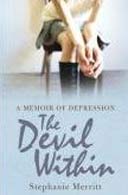
When Stephanie Merritt, an Observer writer, was 17, a darkness descended on her, entering her body through her 'ears and nostrils like vapour' and wrapping itself around her brain. As she tumbled into a suffocating depression, she became fearful of company and her own voice. It was a period that marked the start of a terrifying journey, which lasted for more than a decade, filling her with an 'unnatural energy' as she rose into the excesses of hypomania, before stripping her of hope as she fell crashing down into the depths of despair.
For Merritt, bipolar disorder was a devastatingly real disease that nearly killed her. More than once, the writer found herself standing at the edge of a precipice, staring into the abyss below and willing herself to jump. Time and again she was saved; by drugs, by fear, but most often by the thought of the agony it would inflict on her parents and young son. 'There are people who consider suicide to be an act of cowardice but they must be people who have never known the ways in which depression paralyses reason and strips you of all belief in the change of seasons,' she says.
During her darkest days, in the grip of postnatal depression, Merritt admits: 'I cried if someone pushed past me at the bus stop; I cried if the lift or bank machine were out of order; I shook and hyperventilated if the phone rang; I went into full-throttle panic attack if plans were changed at the last minute.' Antidepressant drugs saved her life, but also triggered murderous nightmares, which left her terrified of sleep. In the periods of respite, when the darkness lifted, she was overtaken by a 'Tiggerish state of mind', which made her drink to excess and once sent her running furiously through the streets of Salamanca, in western Spain. A chart of Merritt's mental-health history, drawn up by a psychiatrist, looked 'like a child's drawing of the sea'.
This powerful memoir will surely speak to anyone who has suffered bipolar disorder or depression. In the end, after turning to drugs, talking and nutritional therapies, Merritt emerged 'optimistic' about the future, but with the knowledge that at any moment she could be plunged 'back into the dark'. She concludes: 'I live like someone who has built a house on a notorious fault line: every day that passes without incident, I feel as if I have got away with something.'

